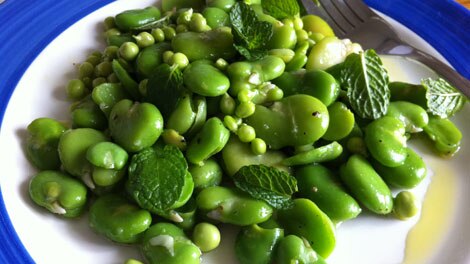 This is a favourite dish in Greece and broad beans are often teamed up with artichokes.
This is a favourite dish in Greece and broad beans are often teamed up with artichokes.It is believed that along with peas, broad beans became part of the eastern Mediterranean diet in around 6000 BC or earlier. They were loved by the Ancient Greeks so much that they were used for voting. A white bean was used to cast a 'yes' vote and a black bean for 'no'.
The term 'pea' was taken from the Latin pisum, which is the latinisation of the Ancient Greek name πίσον (pison) or πίσοc (pisos).
In Ancient Greece and Rome beans were used as a food for the dead, similar to how we have 'kolliva' today. Pythagoras of Ancient Greece forbade his followers from eating beans because it was believed they contained the souls of the dead.
In some parts of Greece peas or broad beans are included in skordalia. In other parts of Greece they make them into a mash ('poure') and add Greek cheeses such as grated kefalotiri, feta or graviera.
In Crete fresh broad beans are shelled and eaten as an accompaniment to tsikoudia, the local alcoholic drink.